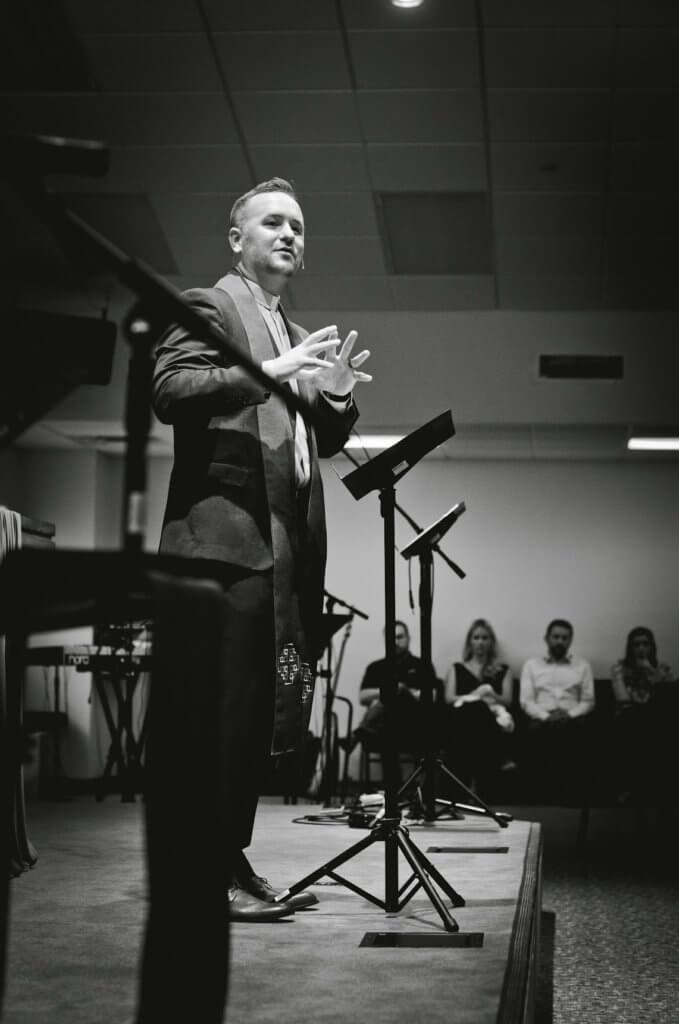by the Rev. Brian Pape
In Part I of this discussion on delegation, we looked at the problem of leaders who over function in their communities and congregations. If you didn’t get a chance to read it, you can do so by going here (insert link).
Over-functioning is a problem for pastors in every age, every size of parish, and at every stage of one’s career. It was a challenge for Moses too. Through Jethro’s coaching, Moses discovers what every leader must come to know deep down: God’s abundance is not just for them; He is also for me.
In Exodus 18, God demonstrates his abundant care and competency over the personal needs of the leader. It does not come to Moses like the manna which fell from heaven or like the water pouring forth from the rock. Instead, abundance comes as Moses releases real responsibility to real people who are right in front of him. Moses experiences God’s abundance by practicing the art of delegation. With the help of Jethro, he makes the move from me to we.
Before we look at how to practice the art of delegation– I want to consider two false substitutes for delegation every pastor faces when navigating the challenges of leadership.
Resignation
Delegation is an ancient leadership struggle that is still prevalent in our modern day. The same blind spot we observed in Moses was also true of Christian leaders we know today, like Eugene Peterson. His numerous publications provide profound insight for how to be a healthy pastor. Yet, in his memoir, Peterson recounts his own struggle with over-functioning in the church and his early incompetence in the art of delegation. A few years after planting a new congregation, the euphoria of the startup and early successes had started to wear thin. Both pastor and people were tired from the heavy lifting required to birth a new faith community. “We couldn’t sustain it. Except that I tried.” (The Pastor, 276)
Like Moses, Peterson found himself overwhelmed by the responsibilities of leadership among the people of God. However, Peterson still did not see delegation as a viable option. The only way out of the mess that he could see was to throw in the towel. Resignation.
A growing number of pastors today are considering this as their only option. Recent data from the Barna group indicates pastors in the United States are currently in crisis and at risk of burnout. Notability, in 2021 alone, one of the more alarming findings is that 46 % of pastors under the age of 45 and 34% of pastors 45 and older say they are considering resigning from their vocation as pastors. This was a 10% percentage increase from the prior year.
Abdication
When a leader is stuck in the muck– over functioning and on their way to burnout– the temptation is to fall for the quick fix of resignation. This is costly for leaders and congregations alike because neither gets the opportunity to grow and mature if the relationship ends prematurely.
However, for leaders who choose to stay the course, we must closely consider what we are and are not to “give away.” We are called to delegate; we are tempted to abdicate. It appears similar on the surface to delegation: both tasks and responsibilities may be passed along. However, a closer look reveals something is amiss.
Have you ever experienced a leader abdicating his/her responsibilities on you? It’s no fun. In my first week of being hired as a Director-level leader of a team within a large church, I quickly found myself asked by the senior pastor to “have a talk” with a tenured, senior employee about leaving his corner office because it was now mine to occupy. Instead of having a difficult disciplinary conversation directly with the employee himself, the leader abdicated the responsibility to me. The pattern of passing off hard conversations continued.
When a leader abdicates, they let go of or pass off the unique responsibility of their office. When a leader delegates, they maintain a proper sense of ownership while delegating the authority for another to carry out an initiative, task, or responsibility.
Thankfully, Moses didn’t resign from his post. Nor did he abdicate his responsibility and say, “this whole judging role isn’t all that important, why don’t you guys grow up and figure it out on your own.” With Jethro’s help, he empowered a team.
Jesus didn’t abdicate his responsibility either. His strategy was centered upon empowering a collaborative team. At the outset of his ministry, he calls, trains, and sends out the twelve apostles to carry out the work of his Kingdom. Have you seen leaders who have a messiah-complex? Well, the actual Messiah did not cling to a one-man model of ministry. He embraced his limits. (See Luke 4:42-44) He empowered a team. Two critical passages highlighting Jesus Christ’s commitment to the art of delegation are Matthew 10 and Matthew 28:16-20. His “span of care” never exceeded twelve direct reports! Once the baton was passed in Acts 1 by Jesus, the Apostles did not abdicate the work either. They empowered a team. (See Acts 6)
A leadership culture that practices healthy delegation is a development culture. So, when we talk about the art of delegation, we are really talking about the lost art of apprenticeship or discipleship. Moses, Jesus, and the Apostles all demonstrate the move healthy leaders make: from me to we.
But how? We must learn to delegate
Jethro proposes an internal shift in the leader that results in a new external practice. Rather than falling for the temptation to resign or abdicate, Moses overcomes the internal barriers and begins to practice the art of delegation.
True delegation requires courageous humility.
Leaders must courageously disrupt unhealthy demands while vulnerably entrusting not just the work but themselves to the community. We must humble ourselves, let go of the super-hero complex and say, “for this community to thrive, for me to thrive, we must become a team.”
Disrupting unhealthy demands requires something quite different from enmeshment. Instead, the individuated leader graciously but consistently says, “this is too much, so how can we solve this problem together?” It takes a healthy leader to set limits and then enlist the help of others.
Eugene Peterson wasn’t a mega-church pastor with 10 or more senior-level staff. He wasn’t given a line of credit from his denomination to plant a new church in suburban Maryland. Like many, he started with a few people in a living room. But the demands grew to a point where he felt the same pressure Moses experienced in the wilderness.
Notice that for Moses and Peterson, it was not good planning but a crisis that caused them to discover the possibility of delegation. Peterson’s elder board didn’t want him to go anywhere. They rejected his resignation and basically offered to fill in the gaps that were draining Peterson’s energy. “Instead of a resignation that night, we had a reorganization.” (The Pastor, 279) Some might see the elder board’s offer to run every committee of the church as an abdication of pastoral responsibility. Nevertheless, Peterson had the courage and humility to face reality: the thing he was doing was not good. He listened to his company of Jethros. He invited participation from the leaders around him. He later testified that this new muscle memory, discovering how to delegate, wasn’t easy at first. A few weeks after responsibilities had been redistributed, Peterson tried to take it all back again. He enjoyed being in charge. Moreover, he realized after the reorganization, “I didn’t trust them. But I had said I would learn. And I did, but it took me awhile.” (The Pastor, 280)
Learning to practice delegation is more art than science. It takes time and discipline to hone the craft. Why is this so important? If your staff only have responsibility but no authority, their creativity is being hampered and they are likely waiting to have the other shoe drop– expecting to be told what they have done wrong. When they have the authority, they get to tell themselves they have done a good job or a bad one. They get to fix their own mistakes and to learn from them, too. Not having authority is disempowering and decreases motivation and job satisfaction. “If your employees believe their job is to do what you tell them, you’re sunk.” (Fierce Conversations, Susan Scott, 121)
In Exodus 18, God’s abundance comes as Moses releases real responsibility to real people who are already right in front of him. I wish I could say that I chose the team model because I was following the pattern set by Jethro, Jesus, and the Apostles, but I was more like Moses and Peterson. I discovered the art of delegation and the power of teamwork through the crisis of exhaustion. Pride and a lack of trust in others kept me from discovering God’s abundance, namely, that there were gifted people right in front of me who longed to discover God’s call. Once they were mobilized, we began to discover the joy and abundance of teamwork in the Kingdom of God.
From Moses to modern-day pastors, from the ancient people of God to the church right in front of you, healthy leaders have limits. Healthy leaders have needs. Healthy leaders learn the habit of saying, “This is not just my problem as the leader to solve alone; this is our problem to solve together.”
What about you? Have you made the move from me to we?
About the Rev. Brian Pape

Brian is a graduate of Angelo State University and Duke Divinity School. After completing his business and theology degrees, he was ordained as a priest in 2014. Brian has been married to Dr. Jennifer Pape for 21 years and they are the proud parents of two children, Tucker and Emery. He previously served as a Rector for 8 of his 20 years of ministry experience and currently serves as Senior Consultant for the AAC’s Anglican Revitalization Ministries.


